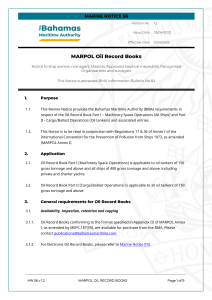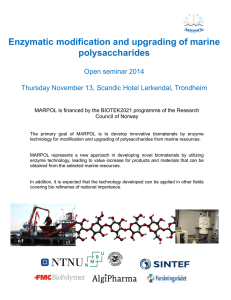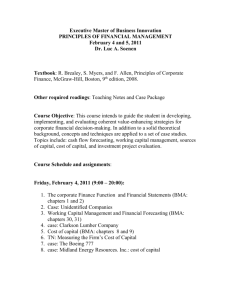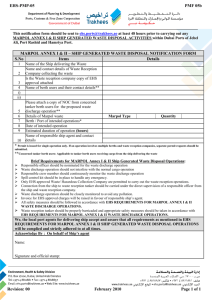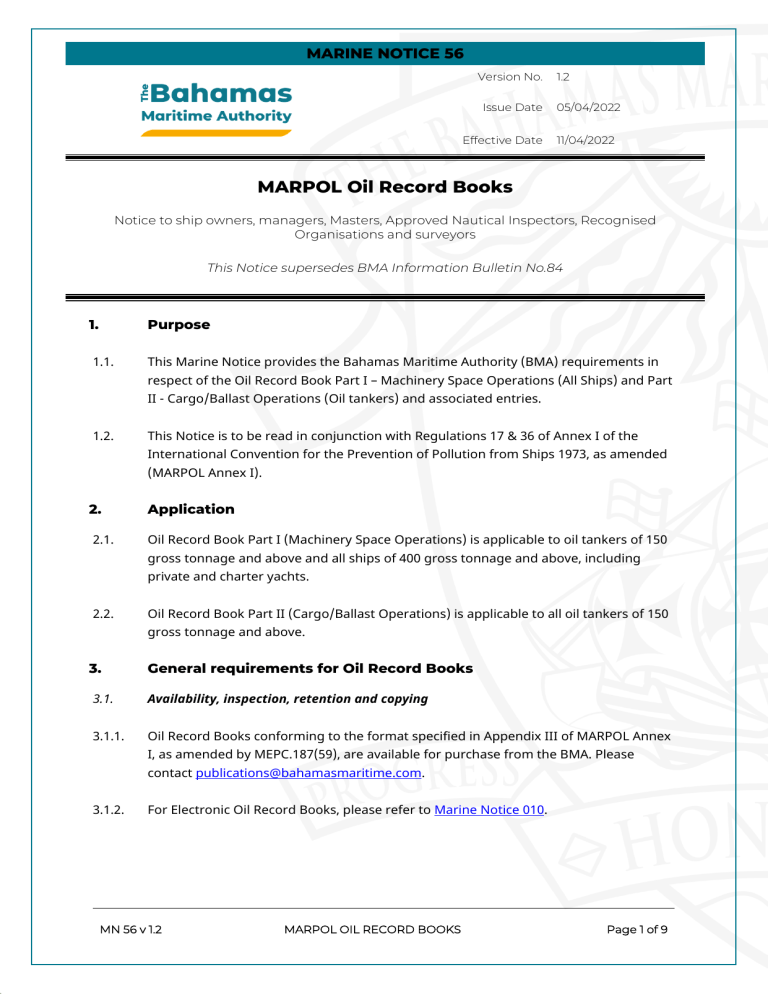
MARINE NOTICE 56 Version No. Issue Date Effective Date 1.2 05/04/2022 11/04/2022 MARPOL Oil Record Books Notice to ship owners, managers, Masters, Approved Nautical Inspectors, Recognised Organisations and surveyors This Notice supersedes BMA Information Bulletin No.84 1. Purpose 1.1. This Marine Notice provides the Bahamas Maritime Authority (BMA) requirements in respect of the Oil Record Book Part I – Machinery Space Operations (All Ships) and Part II - Cargo/Ballast Operations (Oil tankers) and associated entries. 1.2. This Notice is to be read in conjunction with Regulations 17 & 36 of Annex I of the International Convention for the Prevention of Pollution from Ships 1973, as amended (MARPOL Annex I). 2. Application 2.1. Oil Record Book Part I (Machinery Space Operations) is applicable to oil tankers of 150 gross tonnage and above and all ships of 400 gross tonnage and above, including private and charter yachts. 2.2. Oil Record Book Part II (Cargo/Ballast Operations) is applicable to all oil tankers of 150 gross tonnage and above. 3. General requirements for Oil Record Books 3.1. Availability, inspection, retention and copying 3.1.1. Oil Record Books conforming to the format specified in Appendix III of MARPOL Annex I, as amended by MEPC.187(59), are available for purchase from the BMA. Please contact publications@bahamasmaritime.com. 3.1.2. For Electronic Oil Record Books, please refer to Marine Notice 010. MN 56 v 1.2 MARPOL OIL RECORD BOOKS Page 1 of 9 MARINE NOTICE 56 3.1.3. Oil Record Books may not be removed from any Bahamian ship except as detailed below for change of Company1. The Oil Record Book is to be kept on board at all times and be readily available for inspection or copying, in accordance with Regulations 17.6 & 17.7 (for ORB Part I) and 36.7 & 36.8 (for ORB Part II) of MARPOL Annex I, as amended. 3.1.4. Attention is drawn to IMO Circular MSC-MEPC.4/Circ.1, whereby only in exceptional circumstances, such as when a port or coastal State Authority can articulate a legal basis and reasons why it is necessary, and when the Master and all the parties concerned agree, should the original records/documents be removed and replaced by certified copies. In such circumstances a receipt should be left on board stating the reason for the removal. 3.1.5. Completed Oil Record Books shall be retained on board for a period of not less than three years, as per Regulations 17.6 (for ORB Part I) & 36.7 (for ORB Part II) of MARPOL Annex I. 3.1.6. When there is a change in the Company operating the ship, Oil Record Books may be removed from the ship to a place of safekeeping by the former Company. Each book is to be kept for a period of not less than three years from the date of last entry and must remain available for inspection by a competent authority, if required. 3.1.7. In the case of removal of the Oil Record Book from the ship by a former Company, a certified copy of the last Oil Record Book in use must be left on board for the benefit of the new operating Company, with entries covering a period of not less than six months. The copy need not be in colour and may take the form of loose sheets, however such sheets must be suitably bound to form an accurate representation of the completed parts of the book in its original format. Certifying the copy may take the form of a declaration signed and stamped by the outgoing ship's Master. Where the latest or any preceding Record Book covering the last 3 years is not available to the new Company, the new Master should prepare a statement confirming that the previous Record Books are not available. The statement shall be appended to the new Record Book and brought to attention of the RO Surveyor at the next IOPP Certificate verification. 3.1.8. The new Company shall open a new Oil Record Book from the date of taking over management of the ship. 1 The “Company” is the entity responsible for the management of the ship in accordance with the ISM Code. For ships which the ISM Code is not applicable, the Company is the Managing Owner in accordance with Section 52 of the Bahamas Merchant Shipping Act. MN 56 v 1.2 MARPOL OIL RECORD BOOKS Page 2 of 9 MARINE NOTICE 56 3.2. Transfer operations 3.2.1. A transfer of any liquid which is required to be recorded in the Oil Record Book includes draining by gravity, movement by pump or manual method, or any other means which effects the movement of that liquid from one location to another. 3.3. Person carrying out the operation 3.3.1. Operations which have the possibility to result in a discharge overboard or tank overflow of oil or oily mixtures shall be carried out by a responsible officer only. 3.3.2. Other operations which cannot result in a discharge overboard or tank overflow may be carried out by a junior crew member acting under the direct supervision of a responsible officer. An example of this is the draining of a leakage tank to a sludge tank with verified available capacity. 3.3.3. Pumping operations should be carried out only by a responsible officer, especially where error in valve operation is possible. 3.4. When to make the Oil Record Book entry 3.4.1. Oil Record Book entries shall be made directly on completion of the operation. 3.4.2. Where a watchkeeping officer makes a number of similar transfers in the course of a watch, it is acceptable to enter the total sum of the transfer into the Oil Record Book as a single entry. The period covered must not exceed six hours and the entry must make it clear that the transfers were made over such a period. An example of this might be several bilges pumped from the same space to the same bilge holding tank. 3.4.3. Where a transfer, discharge or other operation is being performed during the course of several watchkeeping periods, an entry should be made in the Oil Record Book by the Chief Engineer Officer, or an officer during whose watchkeeping period the operation has been completed, or the officer responsible for cargo operations, as applicable. 3.5. Person making the entry 3.5.1. The person making the entry into the Oil Record Book must be the person who is directly responsible for carrying out that particular operation. 3.6. In the case of an operation which is carried out by a person who is not an officer, the responsible officer must make the entry into the Oil Record Book. MN 56 v 1.2 MARPOL OIL RECORD BOOKS Page 3 of 9 MARINE NOTICE 56 3.7. Acceptable standard of entry 3.7.1. Every effort must be made to ensure that the correct code letter, item number and narrative record are selected when making the Oil Record Book entry. All three items are required to be entered before the entry can be considered complete. 3.7.2. Code Letter - It is essential that the appropriate code letters are assigned, in order to identify the type of liquid being transferred. For example, for Oil Record Book Part I entries, code (C) must be assigned where oil residues (sludge) are concerned and Code (D) or (E) must be assigned where bilge water is concerned. 3.7.3. Item Number - The item number must be chosen with great care, as experience has shown that the item number is often interpreted differently by third parties. 3.7.4. Narrative Record - Care must be taken to ensure that the narrative record clearly identifies the exact operation which has been carried out. Supporting relevant information such as quantity, time, position etc. must be supplied as required. 3.7.5. The BMA considers that if the code letter and narrative record of operations clearly identify the potential pollutant and the associated operation which has been carried out, with relevant required information given, the intent of the Oil Record Book entry requirements has been satisfied. The item number must also be entered in good faith, although its susceptibility to third party interpretation is recognised. 3.8. Post-entry procedure 3.8.1. Each entry must be checked at the earliest opportunity by the Chief Engineer Officer or Master for accuracy and content. Any necessary amendments should be made within 24 hours of the operation carried out. 3.8.2. Amendments are acceptable provided that they are endorsed by both the Chief Engineer Officer or Master and the officer responsible for the operation. Amendments shall take the form of a single thin line through the erroneous entry and must include the date of amendment. A corrected entry is to be made at the first clear line available below. 3.8.3. For ships which utilise the services of a third party for overseeing pollution prevention operations, such as an Environmental Officer on board passenger ships, checking of the Oil Record Book and endorsement of any necessary amendments may be made by that person in lieu of the Chief Engineer Officer or Master, provided that this responsibility is clearly defined within the ship's Safety Management System. MN 56 v 1.2 MARPOL OIL RECORD BOOKS Page 4 of 9 MARINE NOTICE 56 3.8.4. Each completed and checked page of the Oil Record Book must be presented to the Master for endorsement without undue delay. 3.8.5. When the Master leaves the vessel, the last partly completed page in the Oil Record Book should be endorsed by the outgoing Master and a diagonal line drawn after the last entry across the remainder of the page. 3.8.6. Subsequent entries should start on a new page of the Oil Record Book and be endorsed by the new Master as per 3.8.4 above. 3.9. Errors found at a later date 3.9.1. If, at a later date, Oil Record Book entries are found to be in error or require to be clarified (such as during an audit or internal review), a note of the relevant findings and any corrective actions is to be attached to the inside cover of the relevant Oil Record Book. No further action is necessary. 3.9.2. The presence of the findings should be accepted by third parties as proof of effective audit and review procedures and the affected entry should not be construed to be a current deficiency in the Oil Record Book. 4. Oil Record Book Part I - Specific issues 4.1. Oil Record Book Part I versions 4.1.1. Oil Record Books are available to purchase from the BMA - please contact publications@bahamasmaritime.com. 4.1.2. The current version of BMA Oil Record Book Part I is Revision 6. Revisions 4 and 5 of BMA Oil Record Book Part I may continue to be used until stock is exhausted. 4.1.3. The BMA has no objection to the use of Oil Record Book Part I issued by other Administrations, provided that they are in the format specified in Appendix III of MARPOL Annex I, as amended by MEPC.187(59). However, it should be noted that Port State Control officers often raise deficiencies where Oil Record Books are used which are not issued by the ship's flag State. 4.2. IMO Circular MEPC.1/Circ.736 and other industry guidance 4.2.1. The BMA advises caution on the use of information contained within IMO circular MEPC.1/Circ.736 and its subsequent revisions and industry guidance on completion of Oil Record Books. Often such documents represent the views and interpretations of MN 56 v 1.2 MARPOL OIL RECORD BOOKS Page 5 of 9 MARINE NOTICE 56 the authors and may not reflect adequately on the MARPOL provisions and the BMA position. 4.2.2. Where a clarification or interpretation of applicable requirements is needed the Master, Chief Engineer and every responsible officer on board shall seek clarification within the text of MARPOL or BMA issued documentation (such as this Notice). Where necessary a direct inquiry may be placed with the BMA. 4.2.3. The "List of Items to be Recorded" at the front of the Oil Record Book Part I is as specified in Appendix III of MARPOL Annex I, as amended by MEPC.187(59), and reflects the mandatory entries to be made under the Convention. 4.3. Recording of date and time 4.3.1. Dates should be recorded in the format dd-MONTH-yyyy (e.g., 01-JAN-2022). 4.3.2. Entries in the Oil Record Book are generally made in local or "ship's" time. 4.3.3. IMO Resolution MEPC.107(49) "Revised guidelines and specifications for pollution prevention equipment for machinery space bilges of ships" requires that 15ppm bilge alarms specified by Regulation 14.6 of MARPOL Annex I, fitted on or after 1 January 2005, should record date, time and alarm status. 4.3.4. In order to reduce the potential for misunderstanding by third parties, the BMA recommends that 15ppm bilge alarms approved under MEPC.107(49) have their time set to UTC. Alternatively, where a ship is operating exclusively in a particular local time zone, the local time may be set. A suitable annotation should be made in the Oil Record Book confirming which time zone is set on the 15ppm bilge alarm. 4.4. Recording of fuel oil sulphur content 4.4.1. The BMA has been made aware that third parties have recorded deficiencies and observations at inspections because sulphur content of fuel oil bunkered has not been recorded in the Oil Record Book Part I under Code (H). 4.4.2. Entries in the Oil Record Book are to be made in accordance with the code descriptions given in the front of the ORB, which are as per MEPC.187(59) - this does not require the sulphur content of the fuel to be recorded. 4.4.3. The BMA observes that the requirement in MARPOL Annex VI is for the sulphur content to be documented by the SUPPLIER on the bunker delivery note (Annex VI, Reg.14.5), which is to be retained on board for a period of 3 years after the fuel has MN 56 v 1.2 MARPOL OIL RECORD BOOKS Page 6 of 9 MARINE NOTICE 56 been delivered on board (Annex VI, Reg.18.6) and for any changeover to be recorded as per Annex VI, Reg.14.6. 4.4.4. Companies operating Bahamian ships may use the Oil Record Book Part I to record sulphur content should they wish, however this may also be recorded in the MARPOL Annex VI Record Book or equivalent - please see BMA Information Notice 011. 4.5. Code (C) Collection, transfer & disposal of oil residues (sludge) 4.5.1. Any transfers TO a tank listed in Table 3.1 of IOPP Form A or B FROM a tank/location NOT listed in Table 3.1 should be made using Code C11.4 (in conjunction with C11.1, 11.2 and 11.3). 4.5.2. Any transfers TO a tank listed in Table 3.1 of IOPP Form A or B FROM a tank listed in Table 3.1 should be made using Code C12.2. 4.5.3. Any transfers FROM a tank listed in Table 3.1 of IOPP Form A or B TO any other tank NOT listed in Table 3.1 should be made using Code C12.2. 4.5.4. A weekly "inventory" of the tanks listed in Table 3.1 of IOPP Form A or B should be recorded under Code C11.1/2/3. 4.6. Codes (D) & (E) Automatic and non-automatic discharge or disposal 4.6.1. There is occasionally confusion regarding "(D) Non-automatic starting of discharge overboard, transfer or disposal otherwise of bilge water which has accumulated in machinery spaces" and "(E) Automatic starting of discharge overboard, transfer or disposal otherwise of bilge water which has accumulated in machinery spaces". 4.6.2. The term "non-automatic" is deemed to refer to the mode of starting, rather than a description of the capabilities of the system in operation. If a system fitted with automatic recirculating, alarm and stop functions is manually started, entries under (D) are appropriate. 4.6.3. Systems which are operated by an automatic start function are required to be entered under (E). However, when this equipment is manually started, an entry would be required under (D)13 Quantity, (D)14 Time, (D)15 Method and also (E)18 Time when the system has been put into manual operation and (E)16/17 Time when put into automatic mode, as appropriate MN 56 v 1.2 MARPOL OIL RECORD BOOKS Page 7 of 9 MARINE NOTICE 56 5. Oil Record Book Part II – Specific issues 5.1. Oil Record Book Part II versions 5.1.1. Oil Record Books are available to purchase from the BMA - please contact publications@bahamasmaritime.com. 5.1.2. The current version of Oil Record Book Part II is Revision 3. 5.1.3. The BMA has no objection to the use of Oil Record Book Part I issued by other Administrations, provided that they are in the format specified in Appendix III of MARPOL Annex I, as amended by MEPC.187(59). However, it should be noted that Port State Control officers often raise deficiencies where Oil Record Books are used which are not issued by the ship's flag State. 5.2. The BMA currently has no special instructions for Oil Record Book Part II. 6. Queries 6.1. Queries relating to this Notice may be addressed to tech@bahamasmaritime.com or any BMA office. MN 56 v 1.2 MARPOL OIL RECORD BOOKS Page 8 of 9 MARINE NOTICE 56 Revision History Version Description of Revision 1.0 First Issue 1.1 1.2 MN 56 v 1.2 Periodic update. Amendments to para.3.1.7, 3.4.3, 4.2.1 and 4.3. New paragraph 4.3.1 and 6 Date format in paragraph 4.3.1 changed to dd-MONTH-yyyy MARPOL OIL RECORD BOOKS Page 9 of 9
